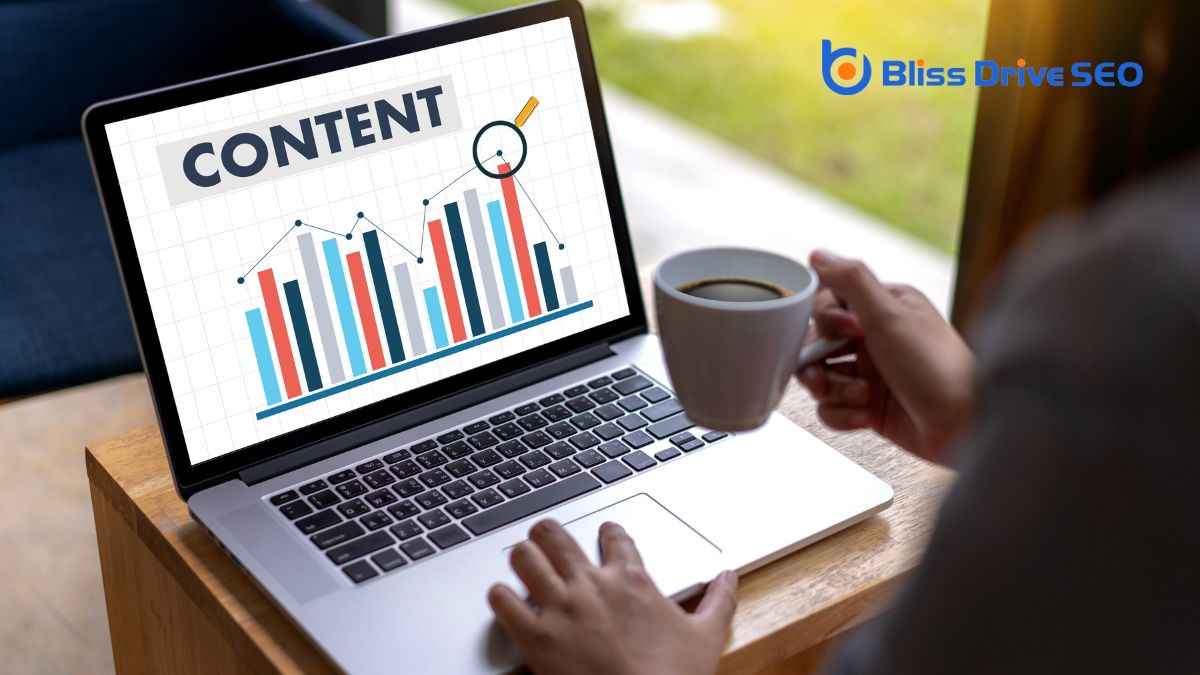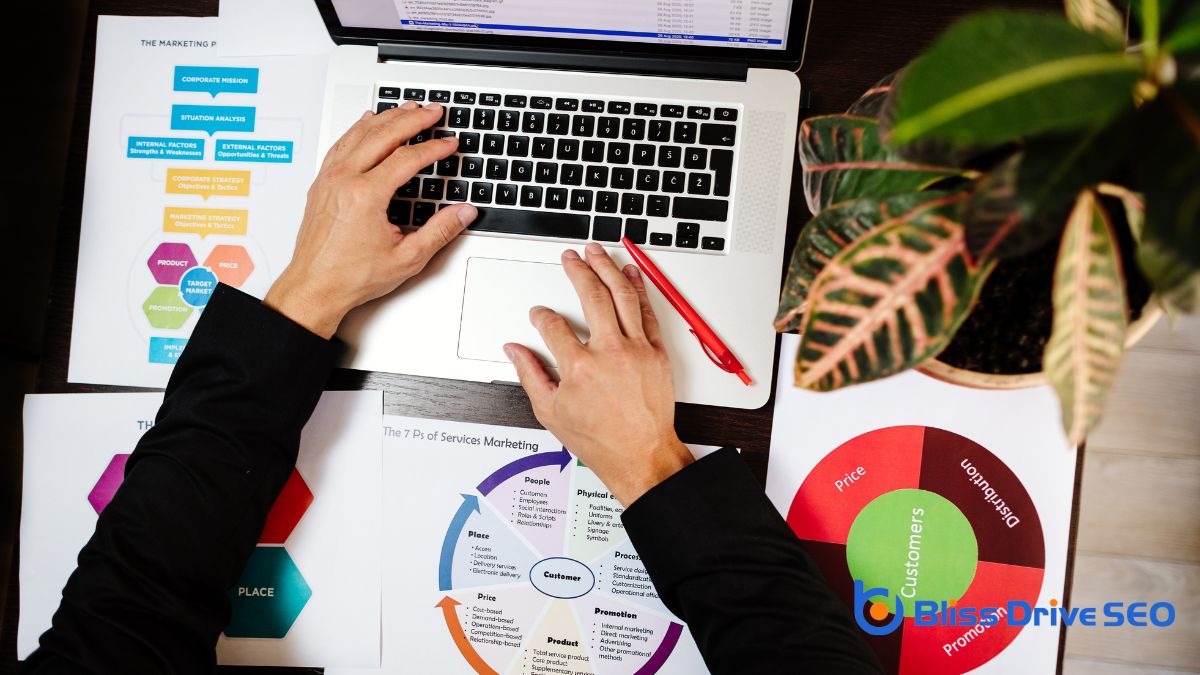Digital Marketing Services
Learn More About Us

Effective content optimizationImproving content to enhance its performance and effectiveness. strategies are vital because they enhance your website's visibility on search engines, improve user engagementThe level of interaction and involvement users have with social media content., and boost overall performance. By aligning with SEO best practices, you guarantee higher search engine rankingsThe position at which a website appears in the SERP. and attract a larger audience. Optimizing content not only enhances user experience with quicker load times and mobile responsiveness but also drives higher conversionThe completion of a desired action by a referred user, such as making a purchase or filling out a fo... rates. Implementing quality content and relevant keywordsWords or phrases that users type into search engines to find information. strategically increases brand exposure and site credibility. Plus, through successful optimization, you can greatly expand your audience reach and outperform competitors. Discover more about unlocking your content's true potential.

When it comes to understanding content optimization, you've got to recognize it's about enhancing your web content for both search engines and users. It's not just stuffing your articles with keywords; it's about making your content easily discoverable, relevant, and valuable to your target audience.
Effective content optimization guarantees your content aligns with SEO best practices. This means strategically using keywords that your target audience is likely to search for. It also involves creating a seamless user experience—your content should be engaging, easy to read, and provide real value.
Optimization is critical for achieving higher search engine rankings. When you fine-tune your content, you're increasing the chances of it appearing at the top of search results, thereby driving more organic trafficVisitors who come to a website through unpaid search engine results. to your site. This isn't just about visibility; it's about credibility. High-ranking content often establishes thought leadership and brand authority.
By optimizing your content, you'll enjoy better search visibility, which can attract more visitors to your site. This increased engagement often leads to higher conversion rates, turning casual browsers into loyal customers. Ultimately, these benefits can greatly boost your online presence and drive business growth.
Effective content improvement methods greatly enhance search visibility, directly impacting your website's performance on search engine results pages (SERPs). When your content is optimized, it naturally enhances its rankings on SERPs, making it easier for users to find you. This increased search presence translates to higher organic traffic as more users are drawn to your improved content.
Standing out in competitive search results is vital for brand exposure and recognition. By optimizing your content, you're ensuring that it appears more prominently, which can leadA potential customer referred by an affiliate who has shown interest in the product or service but h... to higher click-through rates. More clicks mean more opportunities for conversions, driving your business towards sustainable growth.
Moreover, with better search visibility, you're not just reaching a larger audience but also establishing your authority within your industry. This improved visibility helps you expand your audience reach, tapping into new potential customers who mightn't have found you otherwise.
In essence, investing in effective content enhancement strategies guarantees that your website's content is seen, clicked, and remembered. This not only boosts your brand's online presence but also contributes significantly to your overall business growth and success. So, don't underestimate the power of enhanced content to achieve improved rankings and higher brand visibility.
Building on the heightened search visibility you've achieved, it's crucial to recognize how content optimization significantly enhances audience engagement. Effective strategies in content optimization can escalate audience engagement by up to 434%, according to HubSpot. When you prioritize content optimization, your audience interaction soars.
For example, optimized content receives five times more engagement than non-optimized pieces, as reported by Marketo.
Further underlining the significance, brands that concentrate on content optimization witness a 40% increase in engagement metricsMetrics that measure user interaction with a website, such as time on site and pages per session., as emphasized by the Content MarketingA strategic approach focused on creating and distributing valuable, relevant, and consistent content... Institute. This means your efforts in creating optimized content directly result in more likes, comments, and shares.
Social shares, specifically, can experience a 60% boost, driving even higher levels of audience engagement.
Moreover, content optimization fosters increased audience interaction through backlinksLinks from other websites pointing to your website, crucial for SEO.. Optimized content generates 97% more backlinks, creating more opportunities for your audience to engage with your material. This network of interactions not only enhances your credibility but also guarantees that your content reaches a broader audience.
Optimizing your content can be a game-changer, driving conversion rates through the roof. Effective content optimization strategies not only draw in more visitors but also convert them into loyal customers. Imagine the impact on your business with a 14.6% average increase in conversion rates. That's just the beginning of what optimized content can do for you.
Consider these benefits:
Search engine optimization (SEO) and conversions go hand-in-hand, forming an important part of any successful digital marketing strategy. When you focus on content optimization, you're directly improving your SEO. Higher search engine rankings make your content more visible, attracting a larger audience.
But it doesn't stop there. Optimized content also enhances the user experience, which is vital for driving conversions.
Incorporating relevant keywords strategically throughout your content ensures that search engines like Google can easily index and rank your pages. This boosts your visibility, making it easier for potential customers to find you.
Adding internal links and gathering backlinks further establishes your site's credibility and authority, which in turn improves your search engine rankings and conversion rates.
Mobile optimizationDesigning and formatting web content to ensure it performs well on mobile devices. is another important factor. Making sure your site is mobile-friendly enhances user experience, making visitors more likely to stay and convert.
Don't forget clear call-to-action elements; they guide users towards taking the desired action, whether it's making a purchase, signing up for a newsletterA regularly distributed email containing news, updates, and content relevant to subscribers., or downloading a resource.

Enhancing content quality is a fundamental step towards achieving digital marketing success. When you focus on creating quality content, you're not just sharing information but also optimizing it to engage your audience effectively. Content optimization guarantees your material isn't only informative but also engaging, which can lead to a 2-4x increase in website traffic.
Here are four key benefits of enhanced content quality:
Real-world examples and case studiesIn-depth analyses of specific instances or examples to highlight success stories or lessons learned.... provide invaluable insights into the effectiveness of content optimization strategies. Take CampaignA set of ad groups sharing a budget, targeting options, and other settings. Monitor, for instance. They struggled with reduced engagement and visibility due to a lack of content depth and optimization. Their experience highlights the importance of thorough optimization efforts.
On the other hand, Taboola's detailed post on content optimization showcases how strategic optimization can make a substantial difference. By focusing on creating valuable content, they illustrated the power of structured and insightful optimization.
Interrupt Media's approach serves as another excellent example. They concentrated on producing targeted content, which notably increased audience engagement. Their strategy included offering related posts and practical tips, ensuring the content remained relevant and valuable to their audience. The use of automationUsing software to send emails automatically based on predefined triggers and schedules. tips further streamlined their optimization process, enhancing overall efficiency.
Additionally, the Fresh Marketing Insights Newsletter provides practical tips on content optimization, aiding marketers in achieving better outcomes. By sharing real-world applications and actionable advice, they help you understand how strategic optimization can transform your content marketing efforts. These case studies underscore the critical role of content depth, targeted content, and automation in driving increased engagement and delivering valuable content.
When diving into content optimization, you'll encounter various types that can greatly enhance your digital presence. Understanding these types will help you maximize your website's potential and boost your overall engagement.

To truly excel in content optimization, conducting competitive research is indispensable. By analyzing your competitors, you can identify gaps in their strategies and uncover opportunities that you can capitalize on. This research provides critical insights into successful tactics that others are using, as well as areas where they fall short, allowing you to make targeted improvements to your own content.
Understanding how your competitors perform helps you create unique and valuable content that stands out. When you know what your competitors are doing well and where they're lacking, you can fill those gaps with content that offers more value to your audience. This not only differentiates your content but also positions you as a leader in your nicheA specific segment of the market targeted by affiliates to promote products or services., ensuring you stay ahead of the competition.
Monitoring your competitors enables you to make strategic adjustments to your content optimization efforts. By staying informed about their moves, you can adapt and refine your strategies to maintain or gain an edge in the market.
[CONCLUDING]: Competitive research is a powerful tool that guides your content optimization toward greater effectiveness, helping you to create content that isn't just unique but also highly valuable.
After gathering valuable insights from competitive research, it's time to focus on on-page techniques to elevate your content's performance. Proper on-page content optimization is essential for improving search engine visibility. Here are four key strategies to help you get started:
Improving user experience is crucial for keeping visitors engaged and driving conversions. By focusing on content optimization, you can greatly enhance how users interact with your website.
For example, reducing load times to under 2 seconds can boost conversions by 74%, making your site faster and more satisfying to use.
To keep bounce rates low, make sure your content is tailored for immobility. Utilize headings and bullet points to break up text, which can increase content retention by 50%. This way, your audience can quickly find the information they require, improving their overall experience.
Mobile responsiveness is another indispensable factor. Optimizing your site for mobile devices can result in a 25% increase in mobile conversions. As more users access content on their phones, a mobile-friendly site guarantees they remain engaged.
Clear calls-to-action (CTAs) are essential for guiding users through your content. Effective CTAs can enhance conversion rates by up to 121%, assisting users in understanding exactly what steps to take next.
Improving user experience not only maintains visitors engaged but also sets the stage for boosting your revenue potential. Effective content optimization strategies can transform casual visitors into loyal customers, thereby increasing your revenue potential. Here's how:
You need content optimization to improve search engine rankings, increase organic traffic, and engage users better. It builds your credibility and authority, boosts conversions, and guarantees your content is relevant and valuable to your audience.
You need a content strategyA plan for creating, publishing, and managing content to meet business goals. to plan, create, and manage your content effectively. Content optimization refines this content to improve quality and visibility, making it more relevant and likely to rank higher in search results.
A content optimization system helps you enhance your content for search engines and user engagement. It uses data-driven insights for keyword researchThe process of finding and analyzing search terms that people enter into search engines., on-page SEOOptimization techniques performed directly on the website, including content and HTML source code., and performance monitoring to attract the right audience and boost your online presence.
Yes, content is crucial to SEO. Search engines use it to determine a page's relevance to search queries. Quality, optimized content boosts visibility, authority, and user engagement, leading to more organic traffic and better search rankings.
To truly succeed online, you've got to prioritize effective content optimization strategies. They boost your SEO, enhance user experience, and ultimately drive conversions. By continuously improving content quality and staying ahead of competitors through research, you'll see a significant uptick in revenue potential. Don't underestimate the power of on-page techniques and user-centric approaches; they're your keys to sustained growth and success. Start optimizing today, and watch your online presence soar!
